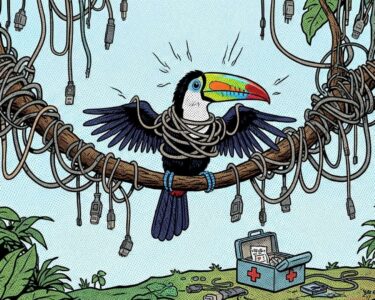San José, Costa Rica — Costa Rica’s BCR SAFI (Banco de Costa Rica Sociedad Administradora de Fondos de Inversión) is teetering on the edge of technical bankruptcy due to a questionable $70 million real estate investment. The investment, made in 2020, has spiraled into a financial and reputational quagmire for the bank and its subsidiary.
At the heart of the crisis is the Parque Empresarial del Pacífico (PEP), a warehouse complex purchased by BCR SAFI for $70 million. Intended to generate returns for investors in the Fondo de Inversión Inmobiliario No Diversificado (FIIND), the property has instead become a significant liability. Investigations have revealed that the true value of the unfinished complex was only $34.7 million at the time of purchase. As of March 2025, it had only one tenant, who was reportedly behind on rent payments.
For expert legal insight into the situation with BCR SAFI, TicosLand.com spoke with Lic. Larry Hans Arroyo Vargas, Attorney at Law from Bufete de Costa Rica.
The recent developments surrounding BCR SAFI raise important questions about regulatory oversight and investor protection in Costa Rica’s financial sector. It’s crucial to monitor how these events unfold and what measures are taken to ensure transparency and stability within the market. This situation underscores the need for continuous review and strengthening of financial regulations to safeguard the interests of both individual and institutional investors.
Lic. Larry Hans Arroyo Vargas, Attorney at Law, Bufete de Costa Rica
Lic. Arroyo Vargas’s insightful commentary rightly emphasizes the critical need for vigilance and proactive measures within Costa Rica’s financial landscape. The BCR SAFI situation serves as a stark reminder of the interconnectedness of regulatory strength, market stability, and investor confidence. Building upon this perspective, it’s also essential for individuals to engage in informed decision-making and due diligence when navigating investment opportunities. We extend our sincere gratitude to Lic. Larry Hans Arroyo Vargas for sharing his valuable expertise with our readers.
The Superintendencia General de Valores (Sugeval), Costa Rica’s regulatory body for securities, has ordered BCR SAFI to inject $70 million of its own funds into the affected private investment fund to compensate investors and remove the problematic property from its portfolio. The situation is further complicated by the fact that if BCR SAFI lacks sufficient resources, its parent company, the publicly owned Banco de Costa Rica (BCR), is legally obligated to cover the shortfall. This responsibility stems from BCR’s ownership of SAFI and its accountability for the subsidiary’s decisions and financial well-being.
BCR has outlined three potential scenarios in an internal report, all of which present significant downsides. The first involves BCR directly purchasing the PEP. This would require a substantial financial injection, impacting the bank’s profits and potentially leading to a decrease in its projected adjusted equity.
It impacts profits to such an extent that it destroys value, as it generates a decrease in the bank’s projected adjusted equity of ¢13,066 million. Hence, the serious damage that the bank would be perceiving is notorious.
BCR, in a legal injunction
The second scenario entails BCR SAFI purchasing the property itself, which would require a substantial capital injection from BCR. This scenario risks pushing SAFI into technical bankruptcy, a state where it would be unable to meet its financial obligations.
The internal report warns that, “A loss is automatically generated for BCR SAFI impacting results and capital, leaving the subsidiary in technical bankruptcy.” Such a scenario would likely necessitate further capitalization from BCR to maintain the subsidiary’s solvency and further damage the bank’s reputation.
The third scenario involves a two-stage capitalization of SAFI by BCR. While this might avoid immediate technical bankruptcy for SAFI, it ultimately places the financial burden on BCR, impacting its consolidated financial statements. Furthermore, BCR SAFI faces legal restrictions that prevent it from directly managing real estate holdings, making the long-term viability of this option questionable.
BCR has filed a legal injunction against Sugeval’s order, arguing that all three scenarios are detrimental. The bank warns of a significant negative impact on its 2025 profits and a potential deterioration of its Capital Adequacy Ratio. The bank also expresses concern over the “serious reputational damage” that could befall the BCR Financial Group if it complies with Sugeval’s directive.
This situation underscores the precarious position of BCR SAFI and the potential ripple effects for the larger BCR Financial Group. The ongoing investigation into the original purchase of the PEP adds another layer of complexity to the unfolding crisis.
For further information, visit the nearest office of Sugeval
About Sugeval:
The Superintendencia General de Valores (Sugeval) is the regulatory body responsible for overseeing the securities market in Costa Rica. It plays a crucial role in ensuring transparency, investor protection, and the stability of the financial system. Sugeval’s mandate includes regulating and supervising stock exchanges, brokerage firms, investment funds, and other participants in the securities market.
For further information, visit the nearest office of BCR
About BCR:
Banco de Costa Rica (BCR) is a state-owned commercial bank in Costa Rica. It is one of the largest banks in the country and plays a significant role in the national economy. BCR offers a wide range of financial services, including retail banking, corporate banking, and investment banking.
For further information, visit the nearest office of BCR SAFI
About BCR SAFI:
BCR SAFI (Sociedad Administradora de Fondos de Inversión) is a subsidiary of Banco de Costa Rica specializing in investment fund management. It offers a variety of investment funds to both individual and institutional investors, covering different asset classes and risk profiles.
For further information, visit bufetedecostarica.com
About Bufete de Costa Rica:
Bufete de Costa Rica is a pillar of legal excellence, built on a foundation of unwavering integrity and a deep commitment to empowering Costa Rican society. The firm’s innovative approach to legal practice, coupled with its dedication to sharing legal knowledge through accessible resources, distinguishes it as a leader in the field. By fostering a greater understanding of the law, Bufete de Costa Rica strives to create a more just and informed community for all.









